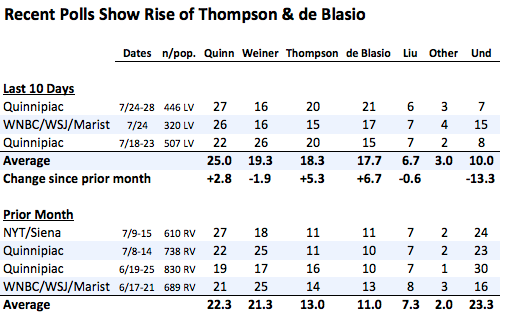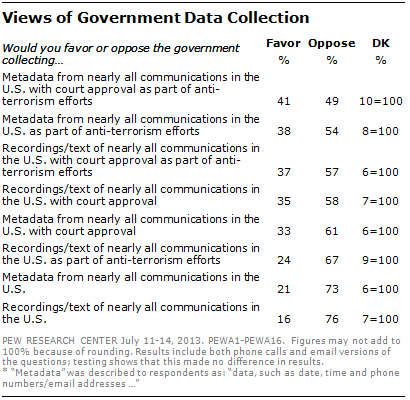
Pew Research finds that varied wording can cause a 25-point shift in reactions to NSA domestic eavesdropping. Another poll shows three candidates not named Weiner leading in the New York City mayor's race. And if we'd listened to Amy Walter we'd put more emphasis on Quinn, de Blasio and Thompson...or New Jersey. This is HuffPollster for Monday, July 29, 2013.
WEINER SLIPS TO FOURTH PLACE IN NYC MAYORAL RACE - HuffPost: "Anthony Weiner has dropped from the front of the pack to fourth place in the Democratic primary for New York City's mayoral race, a poll released Monday by Quinnipiac University finds, with voters increasingly viewing his personal history as a legitimate issue in the election. City Council Speaker Christine Quinn now leads the primary field with 27 percent of likely Democratic voters, with Public Advocate Bill de Blasio and former Comptroller Bill Thompson taking 21 percent and 20 percent, respectively. Weiner, a former congressman, has just 16 percent....The share of Democratic voters saying Weiner's history of sending of lewd photos is a legitimate issue in the race jumped 15 points to 65 percent, up from 50 percent in the previous Quinnipiac poll. Forty percent now say that his behavior is a disqualifying factor, up from 23 percent just two weeks previously." [HuffPost story, Quinnipiac release]
de Blasio and Thompson Rising - The consistent finding of the last three polls, including a prior Quinnipiac survey conducted just before Weiner's "Carlos Danger" revelations, is a bump up for candidates de Blasio and Thompson. Both were winning support in the low teens in polls of all registered Democrats conducted in late June and early July. But the average of the three most recent likely voter polls conducted over the past ten days shows both winning support in the 15 to 21 percent range. Simple averages of the polls shows a roughly 5 point increase for Thompson (from 13.0 to 17.7 percent) and roughly 7 point increase for de Blasio (from 11 to 17.7 percent).

Quinn still vulnerable in run-off - The Guardian's Harry Enten: "Consistently strong polling by Quinn, the frontrunner in most surveys, belies her potential vulnerability in a mayoral runoff, to be held if no one candidate gains 40% of the vote. Quinn's net favorability rating has lagged both De Blasio and Thompson, potential runoff opponents. A Quinnipiac poll last week of a hypothetical Democratic runoff between Quinn and Thompson found Thompson out front 51--42." [Guardian]
Should we just stop talking about Anthony Weiner? Amy Walter: “I know the Anthony Weiner saga is buzzy and great for ratings. But, in the end, it's terrible for those of us who love covering politics, and for the institution of public service itself....At the end of the day, the best way to ensure we get more of the good people and fewer Anthony Weiners in office is to take away the one thing folks like Weiner need to survive: attention. Weiner would rather hold 100 humiliating press conferences than live the life of an anonymous New Yorker. Take away the cameras and you've taken away his oxygen." [Cook Political]
REGIONAL RIFTS ON ABORTION INCREASE - Pew Research: “While the balance of opinion toward abortion nationwide has remained largely steady over the past 20 years, there are widening disparities in public attitudes on the issue across different regions of the country. Opposition to legal abortion is highest in parts of the South – including Texas, which recently passed sweeping new abortion restrictions. The South Central region is the only one in which opposition to legal abortion has significantly increased since the mid--1990s. By contrast, support for legal abortion remains highest in New England – and the gap between New England and South Central states has widened considerably over the past two decades." [Pew Research]
PEW RESEARCH FINDS RISING WORRIES ABOUT NSA SURVEILLANCE - HuffPost's Emily Swanson: "More Americans now worry more about anti-terrorism policies encroaching on civil liberties than not going far enough to protect the country, according to a new Pew Research Center poll that also shows many Americans believe the government is collecting far more private communications data than it has acknowledged. By a 47 percent to 35 percent margin, most respondents to the poll said that their bigger concern about United States anti-terrorism policies is that they go too far in restricting civil liberties, rather than not going far enough to protect the country...The result marks a reversal in Pew's polling since 2004, which has consistently found that a greater percentage of Americans were concerned about anti-terrorism policies not going far enough rather than going too far. As recently as October 2010, a Pew poll found almost the exact reverse -- 47 percent said that anti-terrorism policies did not go far enough, while only 32 percent said they went too far." [HuffPost, see also Pew Research report]
Also finds perception of widespread eavesdropping - More from Swanson: "In the new Pew poll, 70 percent of respondents said they believe the government data collection goes beyond anti-terrorism efforts, while only 22 percent said that the information is being used only to investigate terrorism. Sixty-three percent of Americans think the government is collecting the contents of Americans' phone calls and emails, while only 18 percent think that only data such as phone numbers and email addresses is collected. In fact, the poll found that 27 percent of Americans think the government is listening to their phone calls or reading their emails. The results are similar to a HuffPost/YouGov poll conducted in June, which also found an impression among many Americans that NSA programs are more expansive than government officials have claimed." [ibid, see also previous HuffPost/YouGov poll]
Unique question wording experiment - Various public polls have found widely varying reactions to the NSA eavesdropping revelations. To check the role of question wording on such responses, the Pew Center conducted four different wording tests in which "the wording of four elements of the program were described differently to different groups of respondents. These are: whether metadata or content is being collected; whether phone calls or emails are being monitored; whether the program has court approval; and whether the program is part of anti-terrorism efforts." Saying the program was part of an anti-terror effort, that it had court approval involved actual recordings of phone calls or texts of email produced more opposition than when these elements were not mentioned. "The combination of these four wording tests produces a total of 16 possible program descriptions, which can be ranked in terms of public support.." The omitted a telephone/email distinction that "did not elicit different responses," and compared "eight possible descriptions, with roughly 250 respondents (one-eighth of the overall sample) in each group....Combined in this way, respondents who heard the program described as collecting only “data such as the date, time phone numbers and e-mails... with court approval as part of anti-terrorism efforts" were the most supportive: 41% said they would favor this kind of program. By contrast, only 16% favored a program they heard described as collecting recordings of phone calls or the text of emails with no mention of either courts or the goal of fighting terrorism – fully 25-points lower than support when these other considerations are mentioned." [Pew Research]

HUFFPOLLSTER VIA EMAIL! - You can receive this daily update every weekday via email! Just enter your email address in the box on the upper right corner of this page, and click "sign up." That's all there is to it (and you can unsubscribe anytime).
MONDAY'S 'OUTLIERS' - Links to more news at the intersection of polling, politics and political data:
--52 percent of Americans would vote to make same-sex marriage legal in all 50 states. [Gallup]
-Scott Clement find concerns about civil liberties and privacy skyrocketing with tea party Republicans. [Washington Pst]
-Amy Walter notes that Obama's lower approval ratings aren't much different from where they were last quarter. Or even last year. [Cook Political]
-Nathan Gonzales challenges Latino Decisions' estimate of the impact of Latino voters on 2014; Latino Decisions responds. [Rothenberg Political Report, NBC Latino]]
-Dan Hopkins is skeptical that messaging will change opinions on Obamacare. [WaPost]
-Alex Bratty finds common partisan ground on dissatisfaction with Congress, but not their diagnoses of the problem. [POS]
-Dan Balz reviews how the Obama campaign won the race for voter data.[WaPost]
-Mark Hugo Lopez highlights a Univision ratings milestone and what is says about U.S. demographics. [Pew Research]
-A NARAL sponsored survey finds that Ken Cuccinelli's position on abortion could help turn out women who voted in 2008 or 2012 but not 2009. [Politico]
-Eric Ravenscraft lists four common statistical misconceptions you should avoid. [Lifehacker]
-Public Opinion Quarterly provides free online access to its special issue on survey measurement. [POQ]
-Peter Mohler lists the reasons he is proud to be a member of the survey research field. [LoveStats]
-Ciara Byrne collects the top 10 iconic data graphics. [FastCoLabs]
-The summer, the most cliched movie plots are about to collide with..big data. [FlowingData]